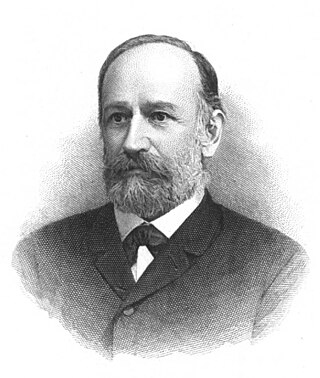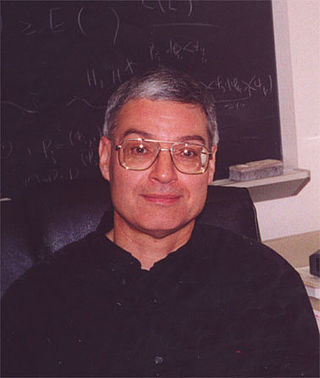
Josef Stefan was a Carinthian Slovene physicist, mathematician, and poet of the Austrian Empire.

Ludwig Eduard Boltzmann was an Austrian physicist and philosopher. His greatest achievements were the development of statistical mechanics, and the statistical explanation of the second law of thermodynamics. In 1877 he provided the current definition of entropy, , where Ω is the number of microstates whose energy equals the system's energy, interpreted as a measure of the statistical disorder of a system. Max Planck named the constant kB the Boltzmann constant.

VictorFrederick "Viki" Weisskopf was an Austrian-born American theoretical physicist. He did postdoctoral work with Werner Heisenberg, Erwin Schrödinger, Wolfgang Pauli, and Niels Bohr. During World War II he was Deputy Division Leader of the Theoretical Division of the Manhattan Project at Los Alamos, and he later campaigned against the proliferation of nuclear weapons.

Marian Smoluchowski was a Polish physicist who worked in the territories of the Austro-Hungarian Empire. He was a pioneer of statistical physics and made significant contributions to the theory of Brownian motion and stochastic processes. He is known for the Smoluchowski equation, Einstein–Smoluchowski relation and Feynman–Smoluchowski ratchet.

The German Physical Society is the oldest organisation of physicists. As of 2022, the DPG's worldwide membership is cited as 52,220, making it one of the largest national physics societies in the world. The DPG's membership peaked in 2014 when it reached 63,000, but it has been decreasing since then. It holds an annual conference and multiple spring conferences, which are held at various locations and along topical subjects of given sections of the DPG. The DPG serves the fields of pure and applied physics and aims to foster connections among German physicists, as well as the exchange of ideas between its members and foreign colleagues. The bylaws of the DPG commit the organization and its members to maintain scientific integrity and ethics, including freedom, tolerance, truthfulness, and dignity in scientific work, as well as promoting gender equality in the fields of physics and related sciences.
The J. J. Sakurai Prize for Theoretical Particle Physics, is presented by the American Physical Society at its annual April Meeting, and honors outstanding achievement in particle physics theory. The prize consists of a monetary award (US$10,000), a certificate citing the contributions recognized by the award, and a travel allowance for the recipient to attend the presentation. The award is endowed by the family and friends of particle physicist J. J. Sakurai. The prize has been awarded annually since 1985.
Michael Ellis Fisher was an English physicist, as well as chemist and mathematician, known for his many seminal contributions to statistical physics, including but not restricted to the theory of phase transitions and critical phenomena. He was the Horace White Professor of Chemistry, Physics, and Mathematics at Cornell University. Later he moved to the University of Maryland College of Computer, Mathematical, and Natural Sciences, where he was University System of Maryland Regents Professor, a Distinguished University Professor and Distinguished Scholar-Teacher.

Giovanni Jona-Lasinio, sometimes called Gianni Jona, is an Italian theoretical physicist, best known for his works on quantum field theory and statistical mechanics. He pioneered research concerning spontaneous symmetry breaking, and the Nambu–Jona-Lasinio model is named after him. When Yoichiro Nambu received the Nobel Prize, Jona-Lasinio gave the Nobel Lecture in his place, as a recognition from Nambu for their joint work. At present, he holds a faculty position in the Physics Department of Sapienza University of Rome, and is a full member of the Accademia dei Lincei.
The Boltzmann Medal is a prize awarded to physicists that obtain new results concerning statistical mechanics; it is named after the celebrated physicist Ludwig Boltzmann. The Boltzmann Medal is awarded once every three years by the Commission on Statistical Physics of the International Union of Pure and Applied Physics, during the STATPHYS conference.

Peter Zoller is a theoretical physicist from Austria. He is professor at the University of Innsbruck and works on quantum optics and quantum information and is best known for his pioneering research on quantum computing and quantum communication and for bridging quantum optics and solid state physics.

Giorgio Parisi is an Italian theoretical physicist, whose research has focused on quantum field theory, statistical mechanics and complex systems. His best known contributions are the QCD evolution equations for parton densities, obtained with Guido Altarelli, known as the Altarelli–Parisi or DGLAP equations, the exact solution of the Sherrington–Kirkpatrick model of spin glasses, the Kardar–Parisi–Zhang equation describing dynamic scaling of growing interfaces, and the study of whirling flocks of birds. He was awarded the 2021 Nobel Prize in Physics jointly with Klaus Hasselmann and Syukuro Manabe for groundbreaking contributions to theory of complex systems, in particular "for the discovery of the interplay of disorder and fluctuations in physical systems from atomic to planetary scales".
John Lawrence CardyFRS is a British–American theoretical physicist. He is best known for his work in theoretical condensed matter physics and statistical mechanics, and in particular for research on critical phenomena and two-dimensional conformal field theory.

Friedrich "Fritz" Gesztesy is a well-known Austrian-American mathematical physicist and Professor of Mathematics at Baylor University, known for his important contributions in spectral theory, functional analysis, nonrelativistic quantum mechanics, ordinary and partial differential operators, and completely integrable systems. He has authored more than 300 publications on mathematics and physics.
The Austrian Physical Society is the national physical society of Austria.
Monika Ritsch-Marte is an Austrian physicist in the fields of biomedical optics, theoretical quantum optics and non-linear optics. She is a professor at the Medical University of Innsbruck and director of the Institute of Biomedical Physics.
Ludwig Flamm was an Austrian physicist.
Claudia Draxl is a physicist. She is a full professor at the Humboldt University of Berlin in theoretical condensed-matter physics.
The Institute of Physics awards numerous prizes to acknowledge contributions to physics research, education and applications. It also offers smaller specific subject-group prizes, such as for PhD thesis submissions.

Helmut Ritsch is an Austrian quantum physicist and a professor of theoretical physics at the University of Innsbruck.









